CORNERSTONE
MESSAGE FROM DEAN ALLISON S. DANELL
Happy New Year from Harriot College! Sharing the latest issue of Cornerstone with you is indeed an excellent way to kick off 2023. In fact, sharing is at the heart of what Harriot College does every day, whether it is sharing knowledge, ideas, support, or more. This sharing spirit ensures our students are encouraged and our employees are inspired, and the networks they build together help us reach far and wide, as you’ll read about in this issue - from Greenville to the coast…even all the way to Alaska!
Our faculty work diligently to provide opportunities that help our colleagues and our students grow far beyond their wildest dreams, and I’m especially thankful for the financial support offered by readers like you. You help make those dreams come true! As we were reminded at our Student Scholarship Luncheon, the true value of a scholarship is so much more than the face value of the award – its impact is compounded in myriad ways, from relieving debt to opening all kinds of doors to new experiences. I am grateful to Harriot College’s Director of Alumni Relations and Outreach, Ashley Harzog, with whom I am pictured at right, for her leadership in this space, and I encourage all of you to reach out to her or myself to share your ECU memories or to grant new wishes!
Anna Isabella Wurz
“I have met and collaborated with so many wonderful, intelligent scientists at ECU, and not only have I received an exemplary education in chemistry and biology, but I have developed key interpersonal and professional skills that will help me succeed after graduation.”
Advancing biochemical research in the manipulation of proteins with assistant professor of chemistry Dr. Robert Hughes, and interacting with federal funding agencies like the National Institutes of Health, who support the work. Wurz is even competing for an NIH Predoctoral Fellowship!

Building her network by joining national professional societies and presenting research at conferences like the 2022 Experimental Biology conference in Philadelphia, PA.
Sharing her enthusiasm for science teaching and learning by assisting associate professor of chemistry Dr. Joi Walker in organic chemistry courses, where undergraduate students work in teams to engage in Course-based Undergraduate Research Experiences (CUREs).
Engaging in campus activities and initiatives as a member of clubs like oSTEM@ECU. She is also part of her doctoral program’s student steering committee and is helping lead the peer-to-peer mentoring program!

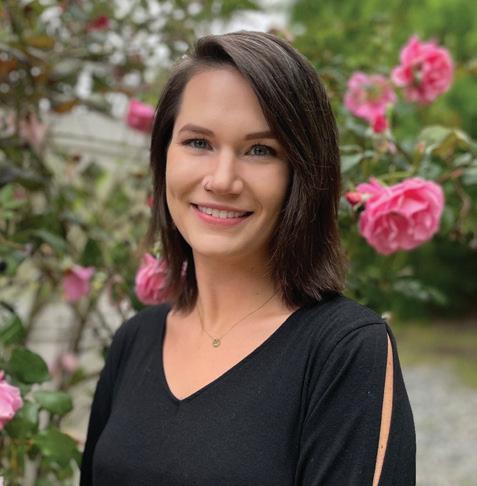
Striving for a career in pharmaceutical research and development with a special interest in new drug therapies for neurodegenerative diseases, specifically Alzheimer’s and Parkinson’s.
Dr. James Morley
Assistant Professor, Department of Biology, Assistant Scientist, Coastal Studies Institute
“I like that CSI serves as a gateway for coastal research across many disciplines within Harriot College. The connection enhances ECU as the dominant force in coastal research within a very unique and ecologically important region of North Carolina and the U.S.”
Leads a research lab in marine fisheries ecology at the Coastal Studies Institute (CSI). ECU is the lead institution at this multi-institutional research center housed in a state-ofthe-art facility in Wanchese, NC.
Research interests include the effects of climate change on marine species and other emerging human impacts on marine and estuarine habitats, with the goal of providing data to policy makers so that they have the tools to make informed decisions affecting fisheries and seafood consumers.
President of the Tidewater Chapter of the American Fisheries Society, whose mission includes not only the conservation and sustainability of fishery resources but also promoting the development of fisheries professionals.
Shares his expertise in coastal ecology and environmental science by teaching at ECU’s Greenville and Outer Banks campuses. Undergraduate students can spend a whole semester at CSI through the Semester Experience at the Coast program!
Winter ‘22/’23
Dean Danell (left) with Ashley Harzog, director of alumni relations and outreach, at the college’s seventh annual Student Scholarship Luncheon!
Student in the Interdisciplinary Doctoral Program in Biology, Biomedicine, & Chemistry
FORGOTTEN BATTLE
ECU researchers receive NOAA grant to explore WWII battle site in Alaska
by Lacey L. Gray, University Communications
Interdisciplinary researchers in Harriot College and ECU’s Integrated Coastal Programs have received a $707,000 grant from the National Oceanic and Atmospheric Administration’s Office of Ocean Exploration and Research to explore the World War II battle site of Attu, Alaska.
The project, “Exploring Attu’s Underwater Battlefield and Offshore Environment,” will be led by Dominic Bush, a doctoral student in the coastal resource management program, and Dr. Jason
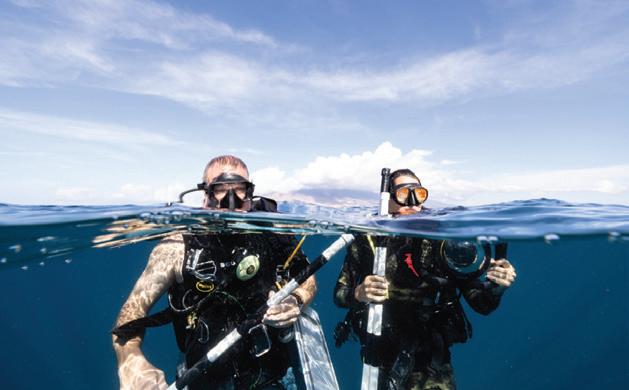
“In June 1942, in a move coordinated with the Battle of Midway, the Japanese military took over Attu and nearby Kiska,” Bush said. “The exact motivation for the invasion of these two Aleutian Islands remains a topic of debate, with historians speculating that it was either a distraction from Midway, an attempt to provide northern flank protection for the Japanese naval fleet approaching Midway, or an effort to establish air bases to either attack mainland Alaska and the West Coast or prevent a northern U.S. invasion of Japan.
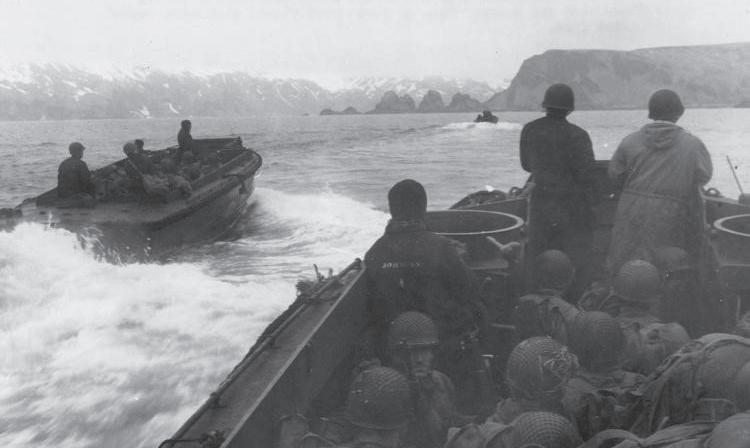
“Whatever the rationale, the move had the psychological benefit of Japan being able to say they now occupy U.S. soil in North America, a feat that had not been done since the War of 1812.”
Raupp, assistant professor of maritime studies in Harriot College’s Department of History. They will survey the seabed surrounding the island to document underwater cultural heritage associated with the battle that took place May 11-30, 1943 — the only WWII battle fought on North American soil.
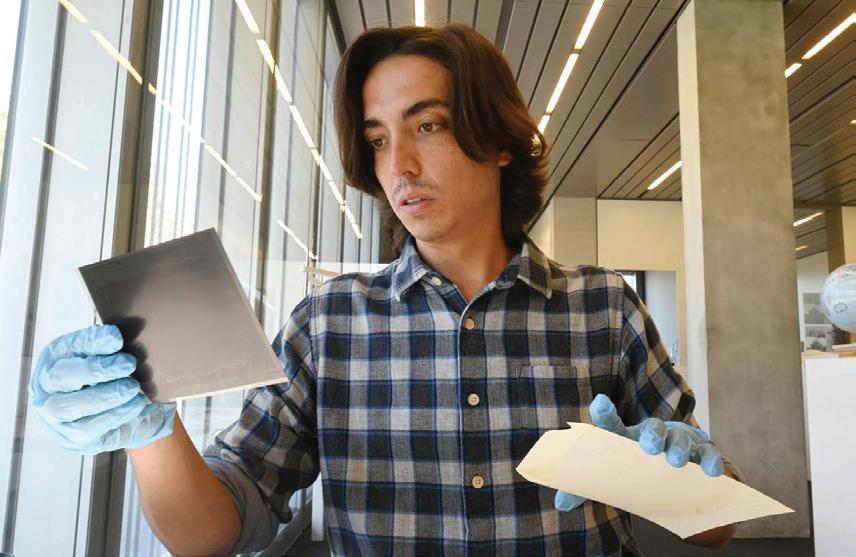
Bush first became interested in the history of Attu during a spring 2020 battlefield archaeology class led by Dr. Jennifer McKinnon, assistant professor of history and maritime studies, who encouraged Bush to apply for the grant.
“Despite the battlefield’s recent incorporation into the Aleutian Islands WWII National Monument, it remains relatively unknown to the American public and is referred to as the ‘Forgotten Battle.’” – Dr. Jason Raupp
“My interest in the Aleutians stems from the fact that I, myself, am part Native Aleut, as my maternal grandmother is the daughter of a full-blooded Chugach woman and a Danish sailor,” Bush said. “I’ve been aware of my Aleutian heritage my entire life but was never told much about it. As the pandemic shut down everything, I decided to completely dedicate myself to this class assignment and learn everything I possibly could about the main WWII conflict in the Aleutians: the Battle of Attu.”
Bush said the three weeks of combat by land, sea and air at Attu resulted in the loss of nearly 600 U.S. service members, with an additional 3,000 injured. The entire 2,500-person Japanese garrison, apart from 29 prisoners of war, perished during the battle.
Field research for the project will occur in the summer of 2023. The team will bring together indigenous Alaskan history experts, maritime archaeologists, marine biologists and innovators in remote sensing technology to document the cold-water marine environment around Attu, and locate and record the remains of ships, aircraft and other military vehicles. The research also may provide a foundation for future work to locate missing-in-action service personnel.
“Being both the westernmost part of North America and the largest uninhabited island in the U.S., Attu presents an exciting but logistically challenging opportunity for research,” Raupp said. “Despite the battlefield’s recent incorporation into the Aleutian Islands WWII National Monument, it remains relatively unknown to the American public and is referred to as the ‘Forgotten Battle.’”
According to Bush and Raupp, while some of the battle’s remains on the island have been documented, Attu’s underwater battlefield has been completely ignored.
“The waters around Attu likely contain a large amount of submerged cultural heritage related to the conflict,” Bush said. “This could include up to 10 U.S. aircraft, nine Japanese aircraft, nine U.S. landing craft, three Japanese ships and numerous smaller barges.”
To read an extended version of this story, visit https://news.ecu. edu/2022/08/02/forgotten-wwii-battle/
2
Raupp and Bush researching in Hawaii in October 2022. (Contributed photo)
American Landing on Attu, May 11, 1943.
Dominic Bush, a Ph.D. candidate and underwater archeologist, looks at 4x5 negatives taken in 1943 during the WWII battle against the Japanese at Attu Island. (Photo by Bill Roth / Anchorage Daily News).
Consider supporting Thomas Harriot College of Arts and Sciences by making a donation online at
ecu.edu/give.
RELATING BLACK WOMEN’S HISTORY
Harriot College Announces Whichard Distinguished Professor in the Humanities
by Ken Buday, University Communications
Harriot College is pleased that Dr. Aleia M. Brown has joined ECU as the college’s David Julian and Virginia Suther Whichard Distinguished Professor in the Humanities. She will hold the professorship from 2022-2025 in the college’s Department of History.
The professorship was established in the mid-1990s by family members of the late David Julian Whichard, a 60-year editor and publisher of Greenville’s The Daily Reflector, and his wife, Virginia Suther Whichard, a former teacher and 1917 graduate of what was then East Carolina Teachers Training School.
“The support of the Whichard family allows us to bring the brightest and best minds like Dr. Aleia Brown to Harriot College and eastern North Carolina,” said Dr. Allison S. Danell, Harriot College’s dean. “As many of the Whichard Chair initiatives and events are open to the public, the impact of their gift goes far beyond our campus community to inspire communitybuilding, learning and regional transformation.”
Brown comes to ECU after serving as the vice president of programs and chief curator at the National Women’s History Museum, where her main responsibility involved developing exhibits and strategies for interpreting women’s history in the United States.
“I am thrilled and honored to work as the Whichard Professor,” Brown said. “Colleagues in history, and the African and African American studies and gender studies programs have been encouraging and supportive.”
VALUE OF SCHOLARSHIP
ECU and the broader community will benefit from Brown’s research and expertise. She is an interdisciplinary scholar with proficiency in 20th-century African American history; Black digital humanities; and Black women’s history, museums, memory and material culture. She prioritizes collaborating with Black communities and organizations, and according to Brown, the eastern part of North Carolina is home to significant points in the Black radical tradition.
“I am grateful to be working in a region where so many people have struggled for labor rights, environmental justice and more. Developing projects with, for and alongside these folks is inspiring,” she said.
In addition to her special projects, Brown teaches Black women’s history and reconstruction, and she plans to teach introduction to Black digital humanities, planting the seeds for work that can continue beyond her time as Whichard professor.


Harriot College celebrates student scholarship recipients, thanks donors
by Lacey L. Gray, University Communications
Dr. Allison S. Danell, dean of The Thomas Harriot College of Arts and Sciences, celebrated students and thanked generous donors at the college’s seventh annual scholarship luncheon on Oct. 28 in the Main Campus Student Center ballroom. This academic year, 178 of the college’s students will benefit from nearly $303,000 in scholarship assistance.
The luncheon’s theme focused on the question, “What is the true value of a scholarship?”
Value includes not only the monetary benefit of accruing less loan debt, but also the flexibility that allows students to focus on academics. Students may take a life-changing study abroad trip, volunteer time and leadership skills through community service, and participate in a transformative internship, all without worrying about financial cost.
“We simply can’t thank you enough for the impact your gift has on the academic lives and journeys of our students,” said Ashley Harzog, director of alumni relations and outreach for the college.
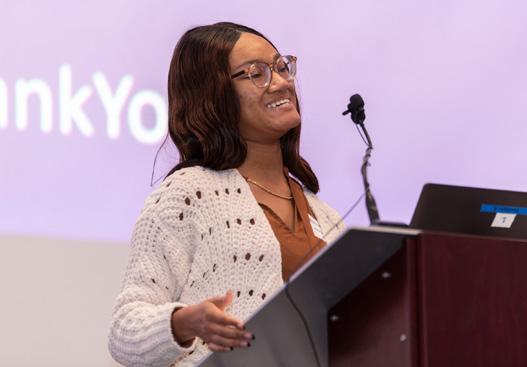
During the event, scholarship recipients mingled with donors, sharing their experiences and gratitude.
“Scholarships, and the generosity of these wonderful donors, are great examples of how ECU supports its students,” said Rachana Charla, a junior majoring in biology and minoring in gender studies. “Being a recipient of a scholarship takes a huge burden off students and their loved ones. Thank you for giving me and my fellow peers the privilege to be able to afford a college education and focus on our studies.”
Harzog concluded by saying, “I believe that scholarships and meaningful connections with alumni and supporters empower our students to achieve great things inside and outside of the classroom.”
Anyone interested in exploring ways to assist Harriot College students, whether via scholarship support or other avenues, may contact Harzog at clelanda18@ecu.edu or by calling 252-737-1753.
ecu.edu/give. Stay in touch with Harriot College by phone at 252-328-6249 or email at thcas@ecu.edu.
3
(Contributed photo)
Rachana Charla
Cheyanne Ware
(Photos by Rob Taylor Photography & Design)
Thomas Harriot College of Arts and Sciences
1002 Bate Building
Mail Stop 511
Nonprofit U.S. Postage PAID Permit #110 Greenville, NC
While attending ECU, Whitehead mainly focused on earning his Master of Public Administration degree from the Harriot College’s Department of Political Science, but along the way, he also met his wife Dana, who received her BS degree in interior design from ECU in ‘96. They soon married and now have a 22-year-old son Jason, who is a senior criminal justice major at LenoirRhyne University in Hickory, NC.

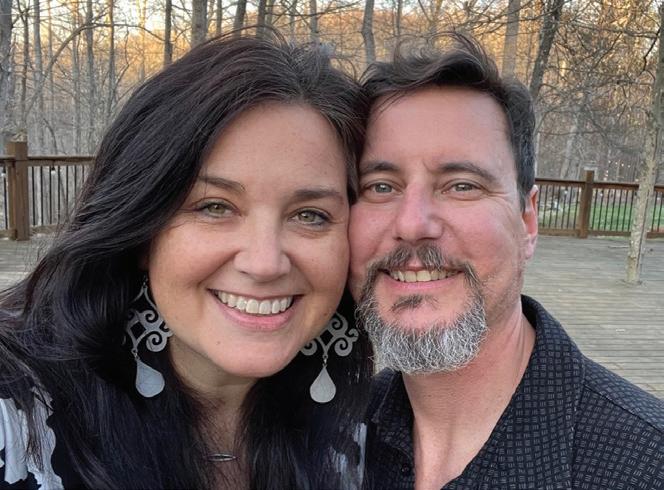
As a student at ECU, Whitehead excelled. He was elected a member of the ECU Chapter of Phi Alpha Alpha, the National Honor Society for Public Affairs and Administration. He performed research for Dr. Kathryn Greene in the College of Fine Arts and Communication’s Department of Communication, and he spent his final year at ECU interning for the small town of Troy, NC, where he served as assistant to the town manager.
The knowledge and experiences Whitehead gained at ECU allowed him to take on his current leadership role as town administrator for Richlands, NC, a position he has held for nearly 25 years.
“Being a town administrator for a small jurisdiction allows me to provide a hands-on approach to a multitude of issues and challenges. I wear many hats and get to be involved in almost every aspect of local government,” Whitehead said.
“What I like best, is the satisfaction of solving problems for the betterment of the community.”

Whitehead credits his experiences at ECU for giving him the skills needed to succeed and help others.
“ECU was fundamental in mentally preparing me to enter the diverse field of local government,” he said. “The academic rigors required by the excellent professors in the Department of Political Science gave me the insights and discipline needed to properly apply what I learned in the classroom to the professional setting. But more importantly, I better learned how to learn, how to research, how to think critically and how to understand the limitations of what I learned in the classroom to real-world experiences and expectations.”
Now, as Whitehead nears retirement, he is considering what he may do in a few years when his career in local government comes to an end. He said his goal is to teach at a community college or university, showing that he wants to give back and help prepare future generations of leaders.
Printed on recycled paper. 3,000 copies of this public document were printed at a cost of $1135.59, or $.38 per copy.
East Carolina University® Greenville, NC 27858-4353 Visit our website at https://thcas.ecu.edu
ALUMNI SPOTLIGHT Gregg Whitehead, MPA, ‘97












